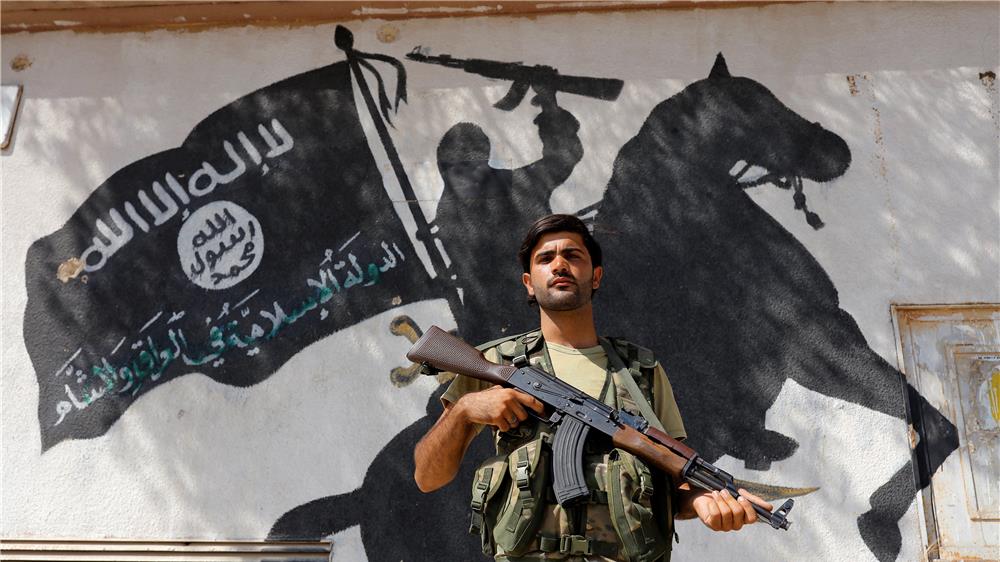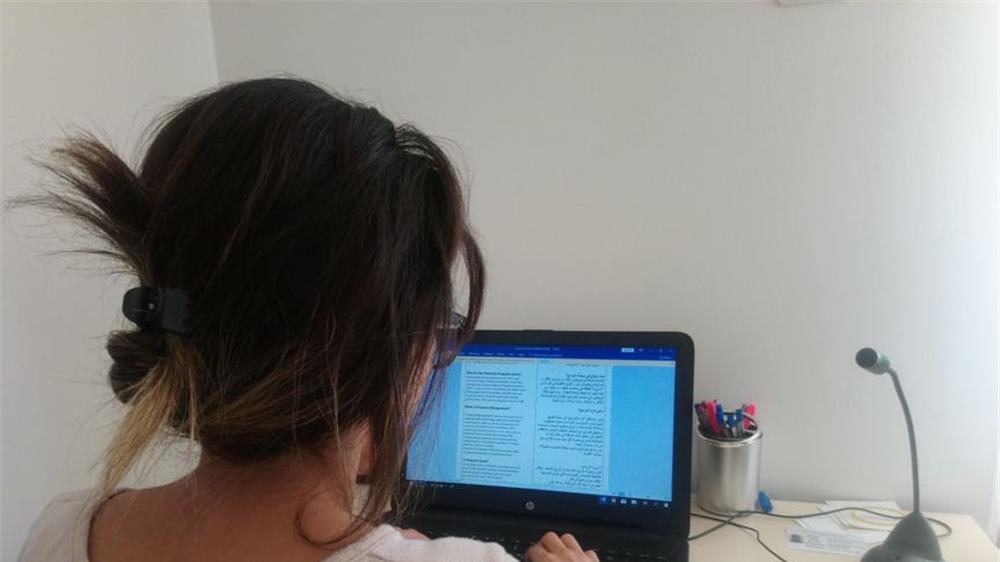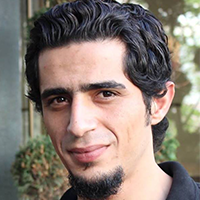"ذات يوم في حلب، كنتُ أعدّ استطلاعا، ومن بين آراء الضيوف ذكر أحدهم اسم الفصيل العسكري "جند الحرمين" وكان عليّ ترجمته، وحينما أنهيت الترجمة وأرسلته للصحفي المسؤول ضحك وقال: "إذا اطّلع المشاهدون على الترجمة سيعتقدون أن هذه الجماعة أشد حركات العالم تطرفا".
روى لي ذلك الصحفي السوري حسين عكوش -وهو يعمل مع عدة وكالات ووسائل إعلامية من بينها الغارديان- حين كان يقع بهذه الأخطاء في بداية عمله.
وتابع أثناء حديثي معه حول أخطاء الترجمة التي يقع بها بعض الصحفيين: هناك مصطلحات سيتغير معناها قليلا عند الترجمة، مثل كلمة "واسطة" المعروفة في الوسط السوري، وأقرب ما يماثلها بالإنجليزية كلمة "Nepotism"، لذا أستعين بهذه الكلمة.
وأكد أن هناك مصطلحات عديدة برزت في الملف السوري ويجد المترجمون صعوبة أحياناً في إيجاد الكلمات المناسبة لها بلغة أخرى، مثل مصطلحات "شبيحة، داعشي، أسدي".
وتتصرف بعض الوسائل الإعلامية في مثل هذه الحالات باستخدام كلمات لها معنى قريب للكلمة الرئيسية، أو كتابتها كما هي بالإنجليزية، مع شرح بسيط يلحق الكلمة.
أيضاً يقف بعض المترجمين عاجزين أمام ترجمة مصطلحات معينة، كأسماء الفصائل العسكرية في سوريا والأمثال الشعبية والجمل التي ترمز لحدث ما، لكن في غالب الأحيان يذكرون اسم الفصيل أو المصطلح كما هو بالحروف اللاتينية، ويضيفون إليه شرحاً بسيطاً.

الشجاعة في الترجمة
ترد أخطاء الترجمة في العديد من الميادين والفعاليات، ولعل أبرزها تلك المتعلقة بتصريحات الساسة والمسؤولين، خاصة إن كان لمحتوى التصريح أهمية بالغة.
في الآونة الأخيرة، تصدرت إدلب المشهد السياسي وتحولت إلى مادة دسمة لوسائل الإعلام، الأمر الذي أدى إلى وقوع أخطاء في ترجمة بعض التصريحات المتعلقة بإدلب.
أثناء بحثي في الموضوع، لاحظت خطأ في الترجمة حصل بموقع جريدة "الوطن" المقربة من النظام السوري، ويتعلق بنقل تصريحات مغلوطة حول موقف الصين مما يجري بإدلب. وجاء في الخبر أن "بكين مستعدة للمشاركة في معركة إدلب"، بينما كان موقفها من ذلك هو "دعم الحل السلمي لأزمة سوريا وبالطرق السياسية".
وما إن نُشر الخبر على موقع الجريدة حتى طالبتها سفارة الصين في دمشق بالاعتذار، لتعترف الجريدة فيما بعد بالخطأ وتنشر توضيحاً.
وينصح مترجمون باتباع إرشادات معينة كي لا يقعوا في فخ النقل الخاطئ لمحتوى الأخبار، خاصة من يعمل في ميدان الترجمة الفورية.
اتصلنا بالصحفي غانم تركماني، وهو يعمل كمترجم بين اللغتين العربية والتركية في وكالة الأناضول الرسمية، فقال أثناء النقاش: "يرتكب الصحفيون العاملون بمجال الترجمة العديد من الأخطاء أثناء عملهم، وأهم أسباب ذلك عدم إلمام المترجم بالحدث وتفاصيله بشكل جيد، وعدم اطلاعه على سياسة الدول التي ترد تصريحات من مسؤوليها حول حدث ما".
ونصح التركماني الصحفيين العاملين في ميدان الترجمة بالابتعاد عن الجمل الغامضة كي لا يتحملوا مسؤولية ما ذكروه وهو ليس بالنص الأصلي، كما يجب عليهم التدرب على السرعة خلال ترجمة الأخبار العاجلة.
وفيما يتعلق بالترجمة الفورية، أضاف أن "الصحفي العامل بالترجمة يجب أن يكون شجاعاً في حالات معينة، كما لا بد أن يكتب ما يراد أن يقال في النص الأصلي".
وتدخل الترجمة في مختلف أنواع المواد الصحفية بدءاً من التقارير والتحقيقات الواردة في الصحف والمجلات إلى الأخبار التي تنشرها وكالات الأنباء على الإنترنت والمقالات ذات الأهمية، إضافة إلى البيانات الصحفية والتصريحات السياسية.
اختلاف المعنى
خلال كلمة مشتركة جمعت الرئيس التركي رجب طيب أردوغان ونظيره الأميركي دونالد ترامب العام الماضي، ورد خطأ في ترجمة تصريحات الجانب التركي، مما أثار ضجة بين وسائل الإعلام.
فقد نقل المترجم حينها تصريحات أردوغان وغيَّر في المعنى، ففي النص الأصلي قال الرئيس التركي: "نتطلع إلى اتخاذ إجراءات من أجل مكافحة التنظيمات الإرهابية بإصرار وبشكل مبدئي، ونتلافى الأخطاء التي عشناها في الماضي".
أما المترجم فقال: "نحن نعلم أنه في إطار المواكبة المبدئية والملتزمة بمكافحة التنظيمات الإرهابية، لن نقوم بتكرار الأخطاء التي حصلت في الماضي وسنستمر في هذه الطريق معاً".
ونقل معنى القول لا ترجمته حرفيا هو من أبرز المصاعب التي تقف أمام الصحفيين المترجمين أثناء عملهم. كما أن العديد من المترجمين يقعون ضحية ترجمة مواد صحفية قبل التحقق من مدى مصداقية هذه المصادر في نقل الأخبار، الأمر الذي يضعهم في دائرة مروجي الشائعات.
ويعتبِر مترجمون يعملون في مجال الصحافة أن أكثر أنواع الترجمة عرضة للأخطاء هي الترجمة الفورية، خاصة أن المترجم لا يملك الوقت الكافي كي ينقل الخبر بوضوح كامل، لذا يعتمد في قول المعنى القريب للنص الأصلي إن كانت التصريحات تحتوي على بعض المصطلحات الغامضة.
اتصلتُ بإيفا وهي صحفية بلغارية تعمل في مجال إعداد التقارير الصحفية وتضطر إلى ترجمتها لعدة لغات.. قالت أثناء الحديث: "أعمل كصحفية مستقلة ومتعاونة مع عدة وكالات أنباء.. عندما أترجم مادة صحفية أحيانا ينتقل المعنى إلى ثلاث لغات من العربية إلى الإنجليزية ومن ثم إلى البلغارية".
وقعت إيفا ضحية مشاعرها أثناء إعداد المواد ذات الطابع الإنساني، وتوضح "أتعاطف أحيانا مع القصص الإنسانية فأجد نفسي قد ابتعدت عن المعنى الأصلي.. هكذا أقع في الخطأ دون أن أشعر".
مزايا إضافية
يوجد عدة صحفيين يملكون في الأصل مهارات التواصل بلغات أخرى نتيجة تعلمهم إياها في وقت مبكر، فتتحول إلى مزايا إضافية يستخدمونها أثناء عملهم الصحفي.
التقيت أيضا المترجمة الجزائرية، خولة سعادة، التي عملت في ميدان الإعلام وتتقن اللغتين الإنجليزية والفرنسية، وهي من أخبرني أن "بعض الصحفيين يتمتعون أصلا بمهارات التواصل بلغات أخرى، وقد استثمروا هذه المزايا في عملهم الصحفي". ومن المعروف أن الأشخاص الذين يتقنون لغات أخرى بسبب ظروف ساعدتهم على ذلك كمعيشتهم في بلد ما لفترة معينة، مطلعون على اللغة ومعانيها بشكل كامل. وهؤلاء أقل المترجمين عرضة للنقل الخاطئ أثناء عملهم، خاصة أنهم على دراية بما تعنيه بعض المصطلحات والأقوال الشهيرة في البلد المتحدث بذات اللغة.

وعن أخطاء الترجمة، أكدت أن "الترجمة الحرفية للنص أكثر الأخطاء المتكررة بين المترجمين، سيما إن كان النص الأصلي يحتمل أكثر من معنى، وهذا ما يجعله ينقل معنى مختلفاً عن المقصود منه".
وتقدم سعادة بعض النصائح لمن يعمل في الترجمة، من أهمها الاطلاع على "أبجدية الصحافة" والمتمثلة في تكوين الخبر القصير والقوالب الصحفية المتبعة وأنواع الأخبار والتقارير.
ومهما برع الصحفيون ممن يعمل في مجال الترجمة فلا يمكن أن يتخلوا عن القواميس التي تعطيهم معاني عديدة للكلمة الواحدة من أجل تلافي الوقوع في خطأ تحريف المعنى.







































